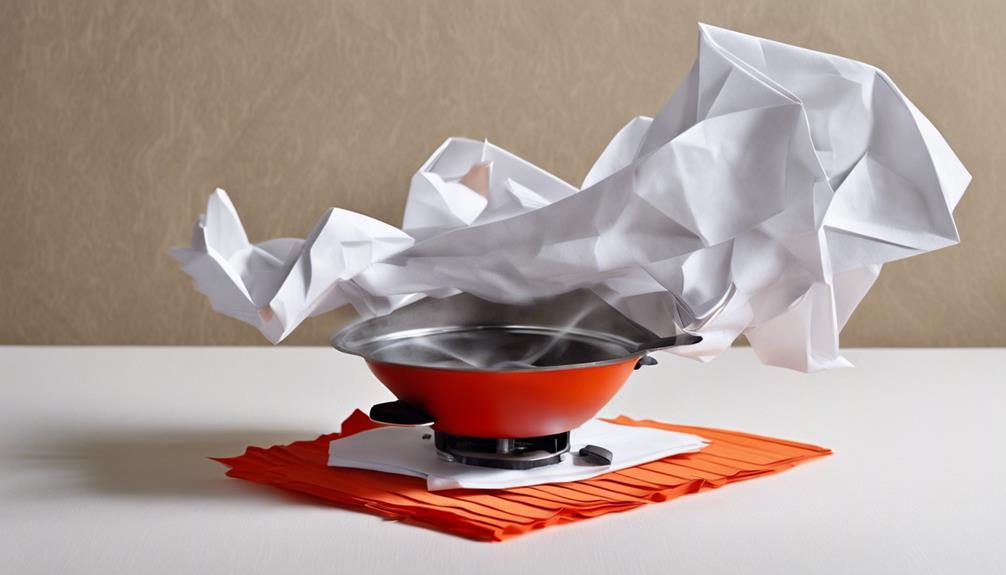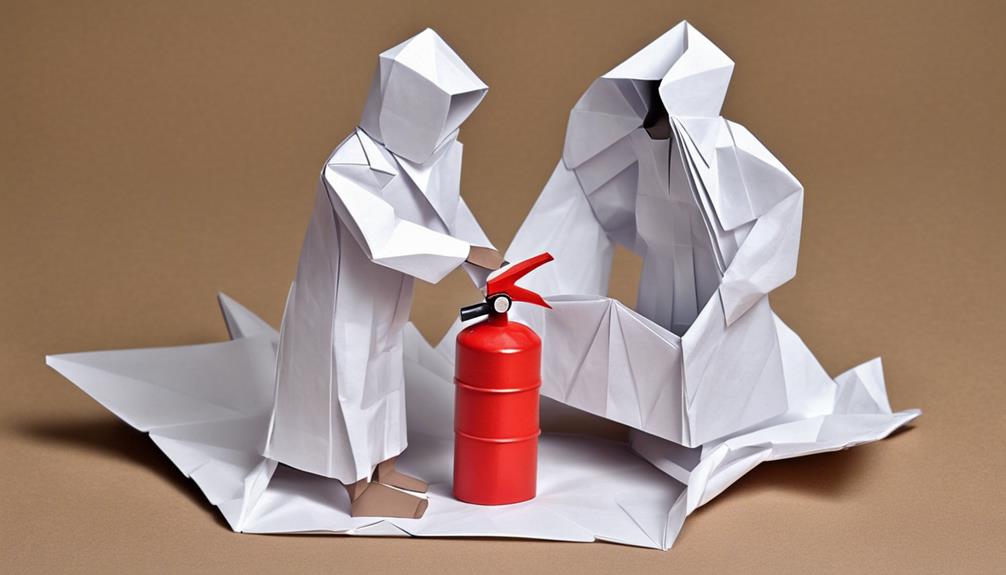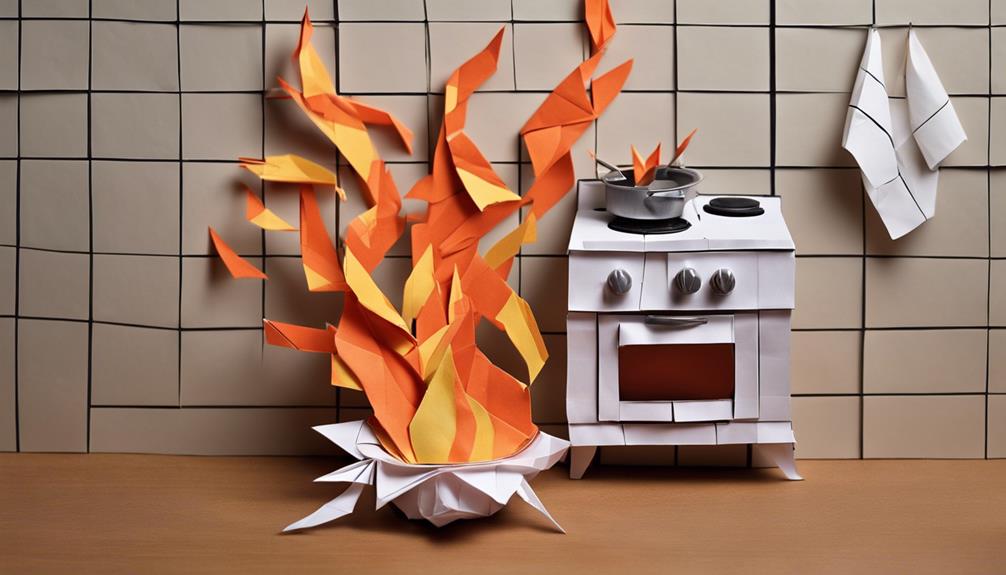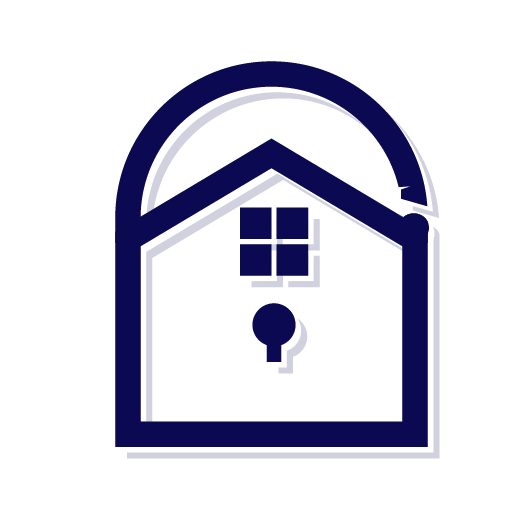Do you know the common mistakes that could turn a peaceful cooking session into a dangerous kitchen fire? Understanding the dos and don'ts of kitchen fire safety is crucial for every home chef. By following a few simple guidelines, you can significantly reduce the risk of fire accidents in your kitchen. Stay tuned to discover essential tips that could save you from a potential disaster in the heart of your home.
Common Kitchen Fire Causes

When cooking in the kitchen, it's crucial to be aware of common causes of fires to prevent accidents. Grease fires are a leading cause of kitchen fires. They occur when oil or grease becomes too hot and ignites. To prevent grease fires, always stay near the stove when frying or cooking with oil, use a thermometer to regulate oil temperature, and keep a lid nearby to smother any potential flames.
Electrical hazards are another common cause of kitchen fires. Overloaded outlets, damaged cords, and faulty appliances can all spark electrical fires. To reduce the risk of electrical fires, avoid using damaged cords or appliances, refrain from overloading outlets, and unplug appliances when not in use. Additionally, consider installing a smoke alarm in the kitchen to provide early detection in case of a fire.
Fire Prevention Tips
To prevent kitchen fires, ensure you have a fire extinguisher readily accessible and know how to use it effectively. In addition to this essential safety measure, practicing proper oven maintenance is crucial. Regularly clean your oven to prevent grease buildup, as accumulated grease can easily catch fire when exposed to high temperatures. Use oven-safe mats or liners to catch any spills and clean them promptly. Check for any signs of wear or damage in your oven, such as frayed wiring, and address them immediately to avoid potential fire hazards.
Another fire prevention tip is to avoid leaving cooking unattended. Stay in the kitchen while cooking, especially when using the stovetop, as unattended cooking is a common cause of kitchen fires. Keep flammable items like dish towels, paper towels, and oven mitts away from the stovetop to prevent accidental ignition. By following these fire prevention tips and staying vigilant in the kitchen, you can significantly reduce the risk of kitchen fires and ensure a safe cooking environment.
Proper Kitchen Fire Extinguisher Use

After ensuring your kitchen is equipped with a fire extinguisher and understanding the importance of proper oven maintenance, the next vital step is learning how to effectively use the fire extinguisher in case of a kitchen fire.
When it comes to extinguisher types, there are different classes designed for specific types of fires. Make sure you have the right type for your kitchen. Here's a quick guide:
| Extinguisher Type | Suitable for Fires Involving | Not Suitable for |
|---|---|---|
| Class A | Wood, Paper, Cloth, etc. | Grease fires |
| Class B | Flammable Liquids | Wood or Paper |
| Class K | Cooking Oils and Fats | Other Fire Types |
Now, let's dive into training techniques. Remember the acronym PASS:
- Pull the pin
- Aim at the base of the fire
- Squeeze the handle
- Sweep from side to side
Practice using your extinguisher so you can react swiftly and confidently in case of a kitchen fire.
Cooking Safety Dos
Ensure that your cooking area is clutter-free and well-ventilated to prevent any potential fire hazards. Proper stove maintenance is crucial for cooking safety. Regularly check your stove for any gas leaks, faulty wiring, or malfunctioning parts. Keep the stove clean by removing grease buildup and food debris to prevent flare-ups.
When it comes to safe food handling, always wash your hands before and after handling food. Use separate cutting boards for raw meat and produce to avoid cross-contamination. Cook food to the recommended internal temperatures to kill off any harmful bacteria. Never leave cooking food unattended, especially when frying or broiling, as it can quickly lead to a fire.
Kitchen Fire Don'ts

Avoid placing flammable items such as dish towels, paper towels, or oven mitts near the stove while cooking to prevent potential kitchen fires. Remember, preventing fires is easier than dealing with them. Here are some crucial kitchen fire don'ts:
- Neglect Fire Extinguisher Maintenance: Don't forget to check your fire extinguisher's expiration date and ensure it's fully functional. Regular maintenance can save lives.
- Ignore Fire Escape Plans: Don't overlook the importance of having a well-thought-out fire escape plan. Knowing what to do in an emergency can make all the difference.
- Misplace Smoke Alarms: Don't install smoke alarms near the stove where they can be set off by cooking fumes. Place them strategically around the kitchen to ensure early detection of any potential fires. Also, be cautious with grease fires; never pour water on them, as it can cause the flames to spread rapidly. By being mindful of these kitchen fire don'ts, you can significantly reduce the risk of fire hazards in your home.
Frequently Asked Questions
What Should I Do if a Kitchen Fire Spreads Beyond Control?
If a kitchen fire grows uncontrollable, remember to stay calm. Even though it may seem overwhelming, your safety is the top priority. In such a situation, immediate emergency evacuation is crucial. Ensure everyone gets out safely. If possible, attempt to control the fire's spread with a fire extinguisher, focusing on protecting yourself first. Once everyone is safe, contact the fire department. Remember, your quick actions can help minimize fire damage and keep everyone out of harm's way.
Are There Any Specific Fire Safety Measures I Should Take While Cooking With Oil?
When cooking with oil, it's crucial to prioritize safety. To prevent oil splatter, make sure the food you're adding to the hot oil is dry and gently lower it in. Maintain temperature control by not overheating the oil, as this can lead to dangerous situations. By staying vigilant and following these guidelines, you can cook with oil confidently and reduce the risk of kitchen fires.
How Often Should I Replace My Kitchen Fire Extinguisher?
When it comes to your kitchen fire extinguisher, it's essential to stay on top of maintenance. Check the pressure gauge monthly and replace it every 5-15 years, depending on the type. Proper disposal is crucial for expired extinguishers. Remember, different extinguisher types require specific training requirements. Stay safe and informed to be ready for any fire emergency in your kitchen.
Are There Any Common Kitchen Appliances That Are More Prone to Causing Fires?
When it comes to kitchen fires, some appliances pose higher risks. Common culprits are stoves, ovens, and toasters due to their heating elements. Safety precautions include regular maintenance, keeping flammable items away, and never leaving appliances unattended. To prevent fires, practice electrical safety by not overloading outlets and using appliances properly. Stay vigilant and follow these guidelines to minimize appliance hazards in your kitchen.
What Steps Should I Take to Ensure My Kitchen Is Properly Equipped for Fire Safety?
To ensure your kitchen is prepared for fire safety, start by organizing your kitchen layout for easy access to fire extinguishers and fire blankets. Implement regular fire drills to practice emergency procedures. Install smoke alarms in key areas to alert you of potential dangers. Keep a fire extinguisher within reach and check its expiration date regularly. Being proactive in fire safety measures can protect your home and loved ones.



